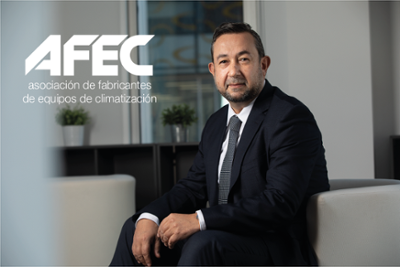

Francisco Perucho (AFEC): “efficient heating and cooling brings us closer to greater use of renewable energies”
Francisco Perucho, Chairman of the Heating, Air Conditioning and Ventilation Equipment Manufacturers’ Association (AFEC) claims that efficient heating and air conditioning based on continuous technological evolution brings us closer to greater use of renewable energies. He also explains how the sector can help drive sustainable cities, and describes the new opportunities offered by decarbonisation and the energy transition.
How can the heating and air conditioning system drive the development of sustainable and efficient cities?
The heating and air conditioning sector is crucial to sustainability and efficiency of cities. We believe that to “condition” means creating optimal conditions of temperature, humidity, air pressure and air quality in interior spaces for the health and comfort of those living there. This means devices for diverse applications including heating, cooling, ventilation, air distribution, diffusion and treatment, filtration and purification for the best interior air quality (IAQ).
We also believe that “sustainability” refers not only to environmental sphere, but to all of the aspects that make it possible for a city model to be maintained over the long term without exhausting resource, be they economic, human or others.
Where does efficient heating and air conditioning take us?
Efficient heating and air conditioning based on continuous technological evolution brings us closer to greater use of renewable energies such as heat pump equipment; increasingly more efficient systems; more recyclable and reusable materials to promote the circular economy (with less of a carbon footprint at the same time); to recovering excess heat for diverse uses (such as production of hot water for sanitary use); rigorous measurements and increasingly more advanced regulation and control systems.
The carbon footprint of a building is estimated to be distributed along the lines of 30% generated during construction (materials, insulation, construction techniques, etc.), and 70% during the use phase; this is the where heating, air conditioning and ventilation will contribute enormously to the development of sustainable and efficient buildings.
What new opportunities does the decarbonisation of society and the energy transition offer?
Achieving carbon neutrality is a long journey and requires the commitment of everyone. The energy transition is one of the pillars of that decarbonisation but there are others, such as reducing demand, harmonising the regulatory framework, creating new habits (cultural transformation), refurbishing rather than rebuilding, connectivity and digital transformation, the integration of systems, etc.; not forgetting important issues like health, creating green spaces and caring for biodiversity, ensuring return on investment, etc.
This process demands new businesses and new professional profiles; with current professional acquiring new skills and assessment of action on a joint basis and from a holistic perspective... These challenges are new opportunities.
What targets has the Heating, Air Conditioning and Ventilation Equipment Manufacturers’ Association (AFEC) set for 2023?
Well, some of the priority objectives that the AFEC has set for this year are the continued raising of awareness around heat pumps, especially as part of refurbishment projects; the launch of a project on regulation and control, closely linked to the demands of the RITE (Building Thermal Installations Regulation) and the EPBD (European Energy Performance of Buildings Directive); continued response to the challenge of digitalisation; promotion and organisation for the C&R Fair; the development of new ways of engaging more closely and more flexibly with our members, the sector and the public sector to provide information on legislative texts and European initiatives; the hosting of the first edition of the AFEC Arroba Awards for media in the sector; and greater promotion of international and overseas activity.
These are ambitious projects, without doubt, but behind them there is a great team, a committed management committee, and an extensive network of experts and member companies who will make it possible to deliver on them.





